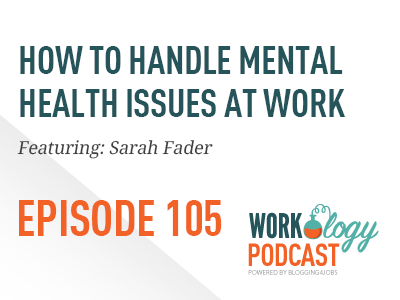An estimated 26.2% of Americans age 18 and older has suffered from a diagnosable mental disorder in a given year. That translates to about 57.7 million people. Outside of company employee assistance programs, there are little resources or information for a large and silent percentage of your workforce. Today I’m shining a spotlight on how workplace leaders can handle mental health issues at work.
Episode 105: How to Handle Mental Illness at Work with Sarah Fader (@thesarahfader)
This episode’s podcast guest, Sarah Fader, is the founder of a non-profit called Stigma Fighters, which dedicates their time to helping real people living with mental illness. Sarah and Stigma Fighters have been published and featured in Psychology Today, the Atlantic and the Huffington Post.
Sarah and I dive into the often times uncomfortable, lonely and taboo topic of mental illness and discuss specifically the type of support and information that business leaders and HR can provide their employees. Sarah first opened up discussing this topic in a Huffington Post article outing herself as someone who suffered a mental illness. The story quickly went viral and Sarah received so much support that she decided to create a safe place for individuals to share their very personal stories, a non-profit called Stigma Fighters.
[bctt tweet=”Nearly 27% of adult Americans suffer from a diagnosable mental disorder every year.” via=”no”]
Sarah walks us through the different types of mental illness diagnoses, including depression, anxiety, schizophrenia, bipolar, and addiction. My favorite part of our conversation is when she shares common misconceptions that people often have of those who with mental illness. She says being diagnosed with a mental illness doesn’t mean that individuals can’t be productive and high-performing employees at your workplace. Her non-profit is encouraging employees to talk to their employers about their need for intermittent FMLA and accommodation requests.
The Importance of the ADA and Accommodation
Sarah’s interview on the podcast provides some important insights into how employees view the Americans with Disabilities Act and requests for reasonable accommodation. Sarah talks us through why it’s important to make accommodations and explains that the average cost of accommodation is under $500. There are a lot of misconceptions about the ADA, which is why employers need to invest in training managers, especially front line, on how to handle and address accommodation requests. You can’t just rely on an internal email or webinar communciation to ensure that accommodations are addressed appropriately. This is critical since such a surprisingly high percentage of Americans live with mental illness. It comes in a variety of forms and, as Sarah points out, mental illness isn’t a visible disability.
You Are Not Alone
Not everyone is like Sarah — or me. Not everyone openly discusses mental illness in public forums like social media, conferences, blogs and the media. I, personally have suffered from depression at different phases of my life which I have choose to write about her on this site and for other publications. Sarah has done the same. Sarah says she tells her stories to let others know that they aren’t alone. Mental illness is often a very private and silent condition that we don’t talk about enough. Those who are suffering can find support and comfort in communities like Sarah’s. But employers need to create a company culture and environment where employees feel comfortable taking time off and even just talking to their leaders. For HR, this podcast serves as a reminder that we need to create opportunities, whether its leader training, an EAP or other health resources for employees to use if they need.
Connect with Sarah Fader on LinkedIn.
RECOMMENDED RESOURCES
– I’m Sorry to Bother You But Please Don’t Leave Me
– How to Raise Awareness About Mental Health at Work
– Mental Illness Statistics from the Kim Foundation
– Mental Health is More Than a Work Perk
How to Subscribe to the Workology Podcast
You can also click here to find out how to be a guest on the Workology Podcast.
*A special thank you to my production team at Total Picture Radio.









One Comment
I love this article. This is very well written. You have truly enriched me with some excellent knowledge.
Comments are closed.